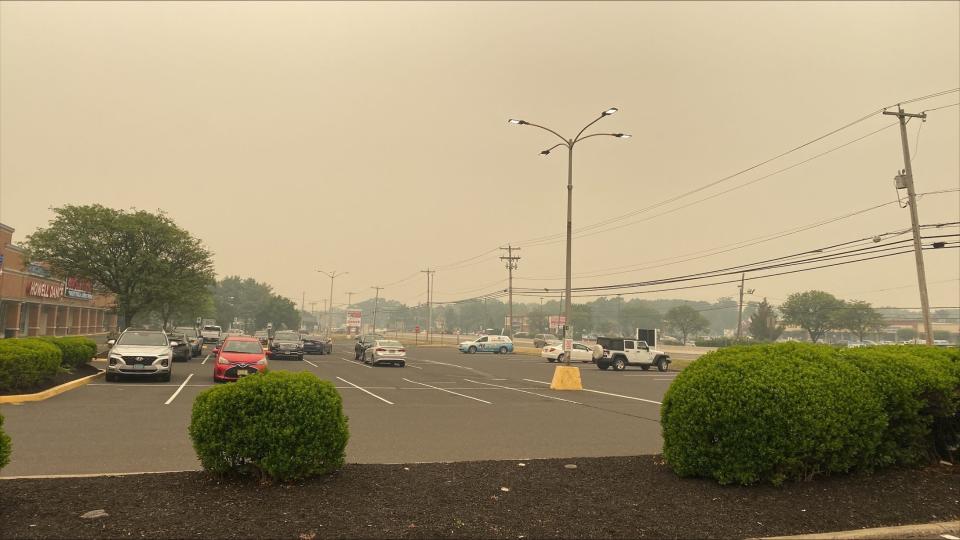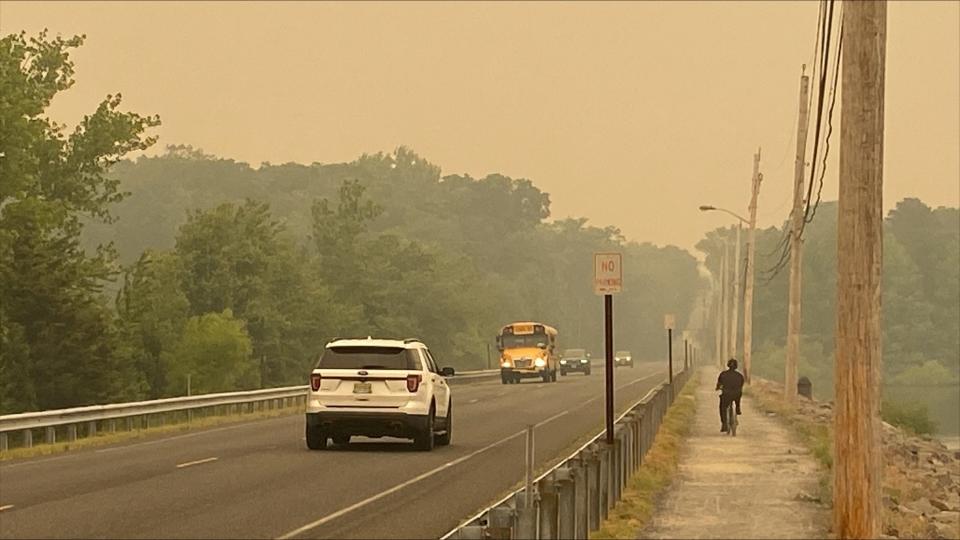'Unprecedented' wildfire smoke, poor air quality expected to remain in NJ another day
- Oops!Something went wrong.Please try again later.
Across New Jersey, commuters and school children who are donning masks and finding outdoor recess canceled want to know: when will the air be safe to breathe again?
The air quality alerts and hazards are expected to linger through Friday, particularly for susceptible groups, like children, people with asthma or respiratory conditions, elderly adults and pregnant women.
During a news conference Thursday, Gov. Phil Murphy blamed New Jersey's hazardous air quality on 10 million acres of burning forest in Canada. There were more than 200 separate fires across Canada, and about 170 of them were out of control, he said.
"We're monitoring the situation closely, and coordinating with our state agencies and beyond our state as we need to," Murphy said.
More: How the Air Quality Index can keep you safe from wildfire smoke entering New Jersey
The New Jersey Department of Environmental Protection issued an Air Quality Alert for Thursday and Friday and urged residents to stay inside with doors and windows closed, to use air purifiers and to avoid strenuous activity. Anyone who must go outside should consider wearing a N95 mask and avoid physical activity, state officials said.
"We need to wait for the steering currents in the atmosphere to shift from the northwest to a more west to southerly direction," said David Robinson, the state climatologist at Rutgers University. "This should slowly occur over the next few days."
Will masks help with smoke?
Dust masks, like those found in hardware stores, will not provide protection from smoke and fine particulates in the air, said Judith M. Persichilli, commissioner of the New Jersey Department of Health.
"If you're going to head outdoors least for (Thursday) and (Friday), wear a mask," said Steven DiMartino, founder of the weather forecasting company NY NJ PA Weather. "You're not just breathing in firewood… All those forest fires also burnt up homes, and home material, building material.
What's closed: Are New Jersey schools, businesses, or government offices closed due to wildfire smoke?
"All of that is floating around in the atmosphere: small plastics, possibly asbestos, all sorts of stuff that was in those homes… You really, really do not want to breathe this stuff in," he said.

Across New Jersey, air quality reached hazardous levels overnight Wednesday into Thursday morning, according to the EPA. Monmouth Beach reported AQI scores, a measure of fine particulate matter in the air, of 500 at 6 p.m. Wednesday evening. That same hour, Matawan had an AQI reading of 455. Poor air quality in Howell peaked at 8 p.m., as the smoke mass moved farther south. Normal readings at these stations is typically between 10 and 20.
Readings over 150 are considered unhealthy for sensitive groups, like people with asthma, and some members of the public, according to the U.S. Environmental Protection Agency. Readings over 300 are considered emergency-level conditions and are likely to affect even healthy individuals, according to the agency.
"What we have seen is unprecedented," said Murphy. "The widespread nature (of the air quality situation) and uncommonly high levels of fine particulate concentrations reaching the unhealthy category is of a historic magnitude."
State employees distributed high quality masks to commuters and NJ Transit personnel at busy bus and rail stations on Thursday. Murphy also encouraged the roughly 1,800 schools and 450 children care centers that received air filtration systems during the COVID-19 pandemic to use their equipment through the end of the week.
"Those were originally aimed at COVID-19 safety, but those (devices) will certainly be helpful on a day like today," Murphy said.
Persichilli said urgent care centers and hospitals were seeing high levels of complaints of asthma. On Wednesday, 143 individuals sought treatment for asthma-like symptoms across New Jersey, a number more typically seen during a particular bad pollen pollution day, she said.
Who should stay in doors?
"Children with breathing problems such as asthma are at increased risk (from the smoke)," said Persichilli. "They should be kept indoors until air quality improves."
Rescue inhalers and other asthma medications should be kept close by for these individuals, she said.

The particulate levels will significantly drop Friday night into Saturday as the wind shifts direction and New Jersey is doused with cleaner air from the upper Midwest and Great Lakes, said Lee Robertson, a meteorologist at the Mount Holly station of the National Weather Service. By Sunday into Monday, air from the south will blow out the last of the lingering smoke, he said.
Until then, state officials continue to urge New Jersey residents to stay indoors, use masks and limit physical activity while the air quality alerts remain in effect.
Amanda Oglesby is an Ocean County native who covers Brick, Barnegat and Lacey townships as well as the environment. She has worked for the Press for more than a decade. Reach her at @OglesbyAPP, aoglesby@gannettnj.com or 732-557-5701.
This article originally appeared on Asbury Park Press: When will air quality improve in New Jersey from Canadian wildfires?

